新概念青少版 1B Unit 21 Breakfast blues 课件(共43张PPT)
文档属性
| 名称 | 新概念青少版 1B Unit 21 Breakfast blues 课件(共43张PPT) | 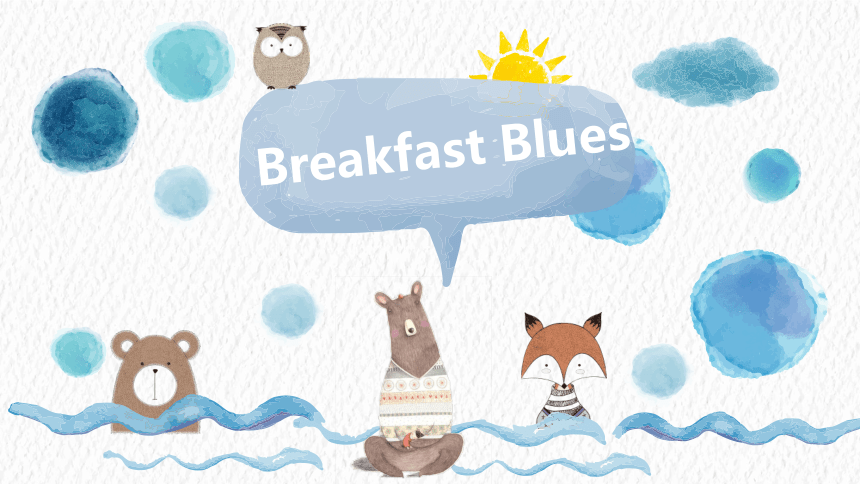 | |
| 格式 | zip | ||
| 文件大小 | 25.8MB | ||
| 资源类型 | 试卷 | ||
| 版本资源 | 新概念英语 | ||
| 科目 | 英语 | ||
| 更新时间 | 2021-10-12 17:05:44 | ||
图片预览

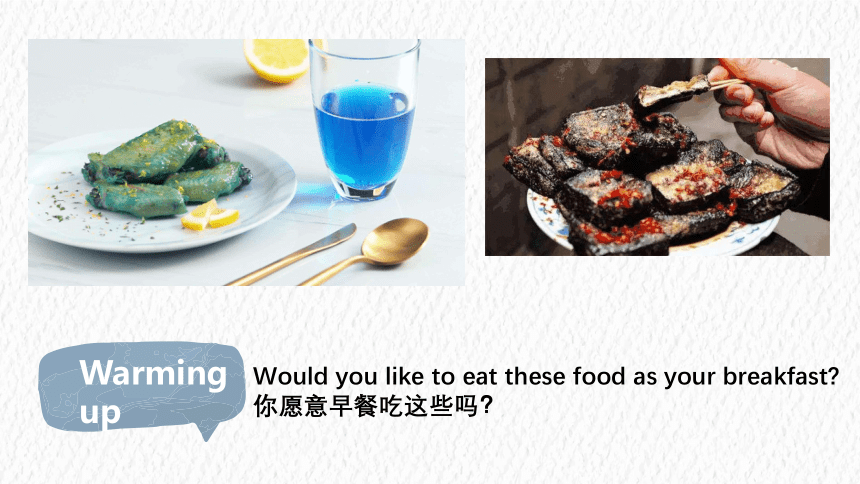
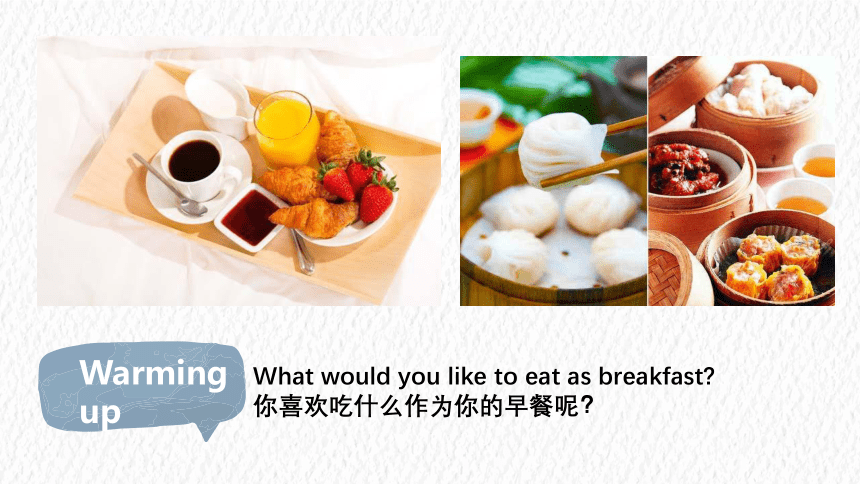

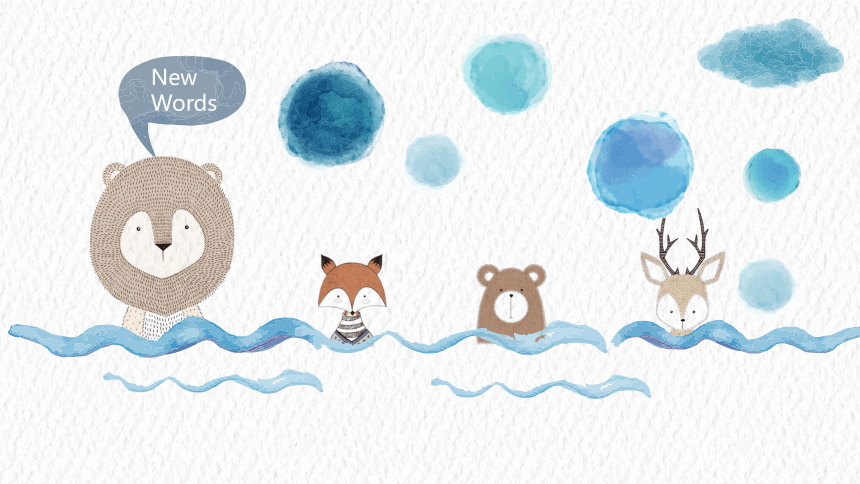
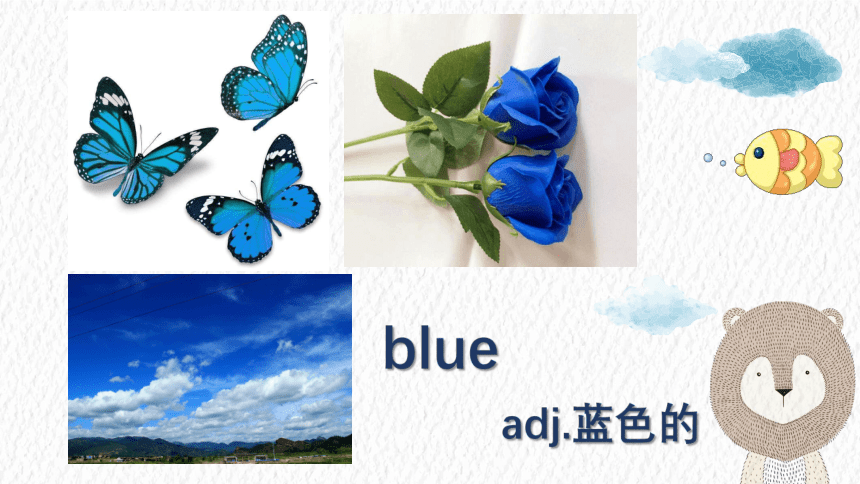
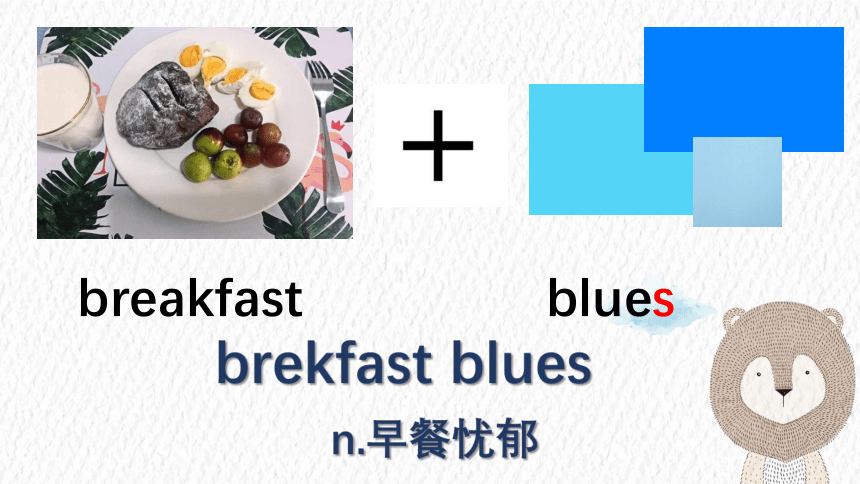
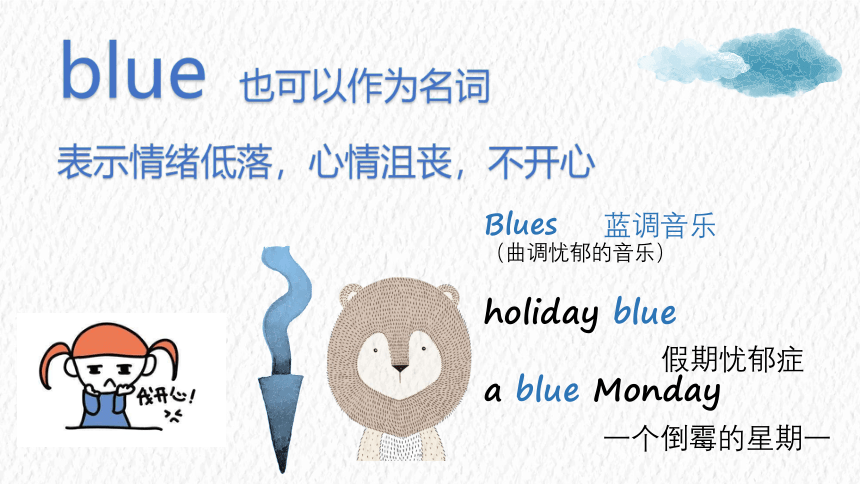
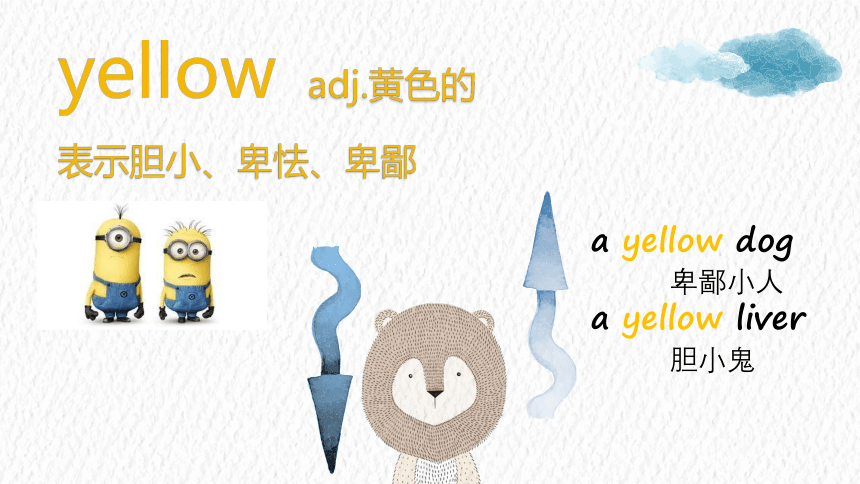
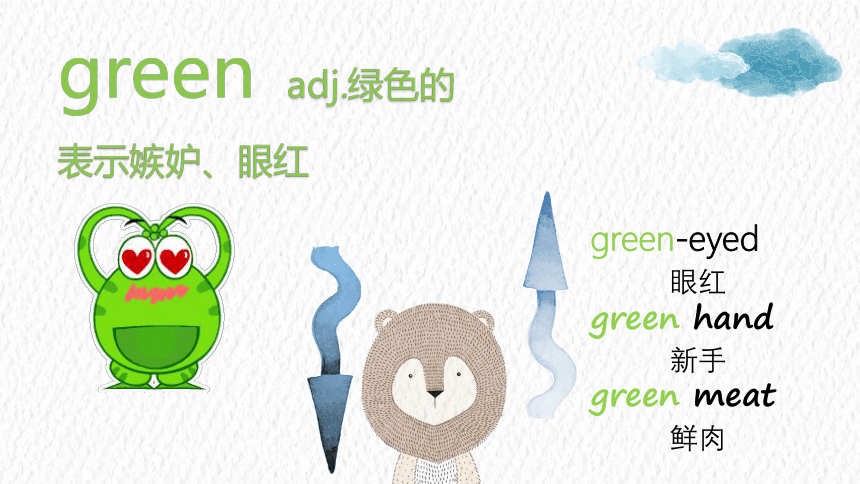
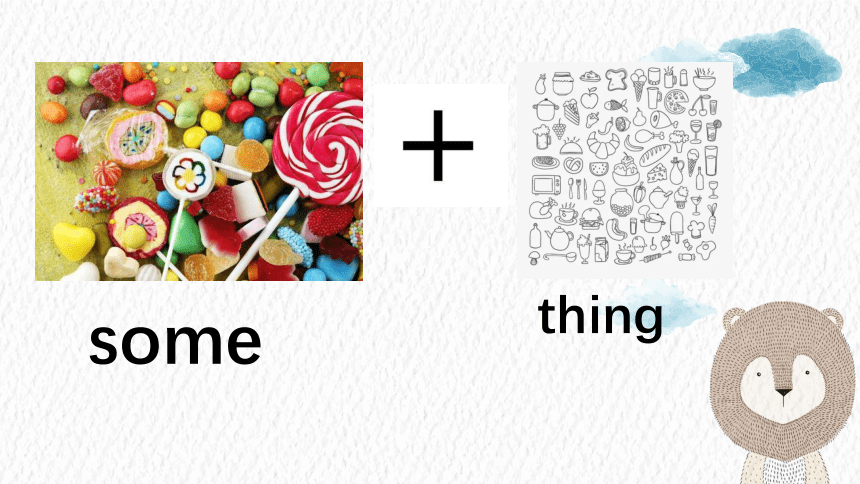
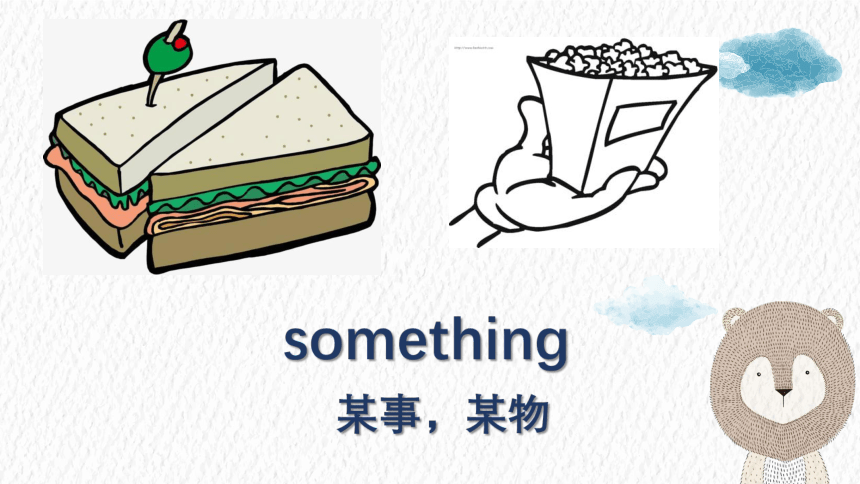
文档简介
(共43张PPT)
Breakfast Blues
Warming up
Would you like to eat these food as your breakfast
你愿意早餐吃这些吗?
Warming up
What would you like to eat as breakfast
你喜欢吃什么作为你的早餐呢?
CONTENTS
New
Words
课文
语法
练习
New
Words
blue
adj.蓝色的
breakfast
blues
brekfast blues
n.早餐忧郁
blue 也可以作为名词
表示情绪低落,心情沮丧,不开心
Blues 蓝调音乐
(曲调忧郁的音乐)
holiday blue
a blue Monday
假期忧郁症
一个倒霉的星期一
yellow adj.黄色的
表示胆小、卑怯、卑鄙
a yellow dog
a yellow liver
卑鄙小人
胆小鬼
green adj.绿色的
表示嫉妒、眼红
green-eyed
green hand
green meat
眼红
新手
鲜肉
some
thing
something
某事,某物
some any every no
thing something anything everything nothing
where somewhere anywhere everywhere no where
one/body someone anyone everyone no one
这些都是不定代词,当不定代词作主语时,谓语用第三人称单数。
Everything ______(be) good, don't worry.
No one ___________(know) where she lives.
is
knows
train n.火车
train v.训练
trainer n.教练
trainers n.运动鞋
stomach
n.胃
[ 'st m k ]
stomachache
/'st m ke k/
胃痛
toothache
/'tu θe k /
牙痛
an empty stomach
/'empt /空的
空腹
Do not drink milk with an __________________.
不要空腹喝牛奶
empty stomach
pot
n.壶
water pot
tea pot
start to do (开始做还没有开始做的事)
start doing(开始做已经准备做的事)
star
start
yoghurt
n.酸奶yoghurt
[ j g t ]
can
thirteen
canteen
n.餐厅
terrible
adj.极坏的,可怕的
/'ter b l/
fruit
n.水果
/fru t/
Do you like eating_______
Apples and melons are my favourite ______.
A. fruit B. fruits
A
B
fruit和vegetable一样,表示集体名词。
fruits是复数形式,表示各种各样的水果
chocolate
n.巧克力
beer
n.啤酒
/'t k( )l t/
/b /
paper
n.纸
tissue/'t u ;/
a piece of paper/tissue
two pieces of paper
一张纸
两张纸
你的题目
早餐忧郁
某事,某物
开始
早晨
早上好
训练
你的题目
/fru t/
/spe /
/ j g ( )t/
/'st m k/
/'m n /
/b /
你的题目
ch___c___l___t___
br___ ____ kf ___ st
s__ ___ ma __ ___
c___ ___ t ___ ___ ____
te__ __ ib__ __
p___t
o o a e
e a a
o
a n e e n
r r l e
t o c h
课文
Listen to the record, answer the question:
Is the food at the academy(学院) good
Lesson 41 Breakfast Blues
Karen: Do you want any breakfast, Paul
Paul: Not really, but I must eat something.
I mustn't train on an empty stomach. Have we got any orange juice
1. want, 想要。 want 某物; want to do 想做某事
2. must 情态动词,一定,必定。表肯定猜测。
否定形式 can't, musn't 禁止,不允许
have got 有, 否定形式: haven't got; 疑问: Have ... got ...
Karen: Yes, we have. There's some in the fridge. How much juice do you want
Paul: Oh, just a small glass, please.
Karen: Here you are.
1. there be句型表示某地有某物,some代替上文提到的orange juice,所以be动词用is. fridge :/fr d /
2. how much... 多少,后跟不可数名词,如money, homework,juice...
how many,.. 多少,后跟可数名词复数,如bananas, eggs,books...
a small glass (of juice) ,不可数名词可以前面用量词表示数量,如一杯
Karen: Do you want any coffee
Paul: No, thanks. Have we got any tea
Karen: Yes, there's some tea in the pot. Help yourself.
1. some 用在肯定句,any用在否定句和疑问句。注意特殊情况:委婉语气※
2. help yourself不是帮助你自己,是自便、自己来的意思。
yourself 反身代词
Karen: Poor Paul! It's a very early start!
Paul: Tell me about it! I can't eat at six o'clock in the morning.
1. poor Paul: poor在这里不是贫穷的意思,是可怜的意思。
2. tell me about it 可不是嘛!
Karen: I've got some yoghurt in the fridge.You can take it with you and have it at the gym.
1. with表示伴随状态,随身带着
2. gym (gymnasium)
3. have it = eat it
4. take it with带着
Paul: Thanks, Karen. That's nice.
They haven't got any yoghurt in the canteen at the academy. The food there is terrible.
1. academy/ 'k d m / 学院
2. terrible 可怖的,极坏的
nice 好的
fantastic 极好的,非常好
wonderful 很好的
awful 不好的,糟糕的
练习
THANKS
Breakfast Blues
Warming up
Would you like to eat these food as your breakfast
你愿意早餐吃这些吗?
Warming up
What would you like to eat as breakfast
你喜欢吃什么作为你的早餐呢?
CONTENTS
New
Words
课文
语法
练习
New
Words
blue
adj.蓝色的
breakfast
blues
brekfast blues
n.早餐忧郁
blue 也可以作为名词
表示情绪低落,心情沮丧,不开心
Blues 蓝调音乐
(曲调忧郁的音乐)
holiday blue
a blue Monday
假期忧郁症
一个倒霉的星期一
yellow adj.黄色的
表示胆小、卑怯、卑鄙
a yellow dog
a yellow liver
卑鄙小人
胆小鬼
green adj.绿色的
表示嫉妒、眼红
green-eyed
green hand
green meat
眼红
新手
鲜肉
some
thing
something
某事,某物
some any every no
thing something anything everything nothing
where somewhere anywhere everywhere no where
one/body someone anyone everyone no one
这些都是不定代词,当不定代词作主语时,谓语用第三人称单数。
Everything ______(be) good, don't worry.
No one ___________(know) where she lives.
is
knows
train n.火车
train v.训练
trainer n.教练
trainers n.运动鞋
stomach
n.胃
[ 'st m k ]
stomachache
/'st m ke k/
胃痛
toothache
/'tu θe k /
牙痛
an empty stomach
/'empt /空的
空腹
Do not drink milk with an __________________.
不要空腹喝牛奶
empty stomach
pot
n.壶
water pot
tea pot
start to do (开始做还没有开始做的事)
start doing(开始做已经准备做的事)
star
start
yoghurt
n.酸奶yoghurt
[ j g t ]
can
thirteen
canteen
n.餐厅
terrible
adj.极坏的,可怕的
/'ter b l/
fruit
n.水果
/fru t/
Do you like eating_______
Apples and melons are my favourite ______.
A. fruit B. fruits
A
B
fruit和vegetable一样,表示集体名词。
fruits是复数形式,表示各种各样的水果
chocolate
n.巧克力
beer
n.啤酒
/'t k( )l t/
/b /
paper
n.纸
tissue/'t u ;/
a piece of paper/tissue
two pieces of paper
一张纸
两张纸
你的题目
早餐忧郁
某事,某物
开始
早晨
早上好
训练
你的题目
/fru t/
/spe /
/ j g ( )t/
/'st m k/
/'m n /
/b /
你的题目
ch___c___l___t___
br___ ____ kf ___ st
s__ ___ ma __ ___
c___ ___ t ___ ___ ____
te__ __ ib__ __
p___t
o o a e
e a a
o
a n e e n
r r l e
t o c h
课文
Listen to the record, answer the question:
Is the food at the academy(学院) good
Lesson 41 Breakfast Blues
Karen: Do you want any breakfast, Paul
Paul: Not really, but I must eat something.
I mustn't train on an empty stomach. Have we got any orange juice
1. want, 想要。 want 某物; want to do 想做某事
2. must 情态动词,一定,必定。表肯定猜测。
否定形式 can't, musn't 禁止,不允许
have got 有, 否定形式: haven't got; 疑问: Have ... got ...
Karen: Yes, we have. There's some in the fridge. How much juice do you want
Paul: Oh, just a small glass, please.
Karen: Here you are.
1. there be句型表示某地有某物,some代替上文提到的orange juice,所以be动词用is. fridge :/fr d /
2. how much... 多少,后跟不可数名词,如money, homework,juice...
how many,.. 多少,后跟可数名词复数,如bananas, eggs,books...
a small glass (of juice) ,不可数名词可以前面用量词表示数量,如一杯
Karen: Do you want any coffee
Paul: No, thanks. Have we got any tea
Karen: Yes, there's some tea in the pot. Help yourself.
1. some 用在肯定句,any用在否定句和疑问句。注意特殊情况:委婉语气※
2. help yourself不是帮助你自己,是自便、自己来的意思。
yourself 反身代词
Karen: Poor Paul! It's a very early start!
Paul: Tell me about it! I can't eat at six o'clock in the morning.
1. poor Paul: poor在这里不是贫穷的意思,是可怜的意思。
2. tell me about it 可不是嘛!
Karen: I've got some yoghurt in the fridge.You can take it with you and have it at the gym.
1. with表示伴随状态,随身带着
2. gym (gymnasium)
3. have it = eat it
4. take it with带着
Paul: Thanks, Karen. That's nice.
They haven't got any yoghurt in the canteen at the academy. The food there is terrible.
1. academy/ 'k d m / 学院
2. terrible 可怖的,极坏的
nice 好的
fantastic 极好的,非常好
wonderful 很好的
awful 不好的,糟糕的
练习
THANKS
同课章节目录
- Unit 16 On the London Eye
- Unit 17 Smile,please!
- Unit 18 Men can cook,too!
- Unit 19 You must eat!
- Unit 20 What a surprise!
- Unit 21 Breakfast blues
- Unit 22 Watching the neighbours
- Unit 23 An expensive camera
- Unit 24 A light dinne
- Unit 25 The weekend shopping
- Unit 26 A self-service restaurant
- Unit 27 Toothache
- Unit 28 Every day is different!
- Unit 29 Many happy returns of the day!
- Unit 30 An internation event
